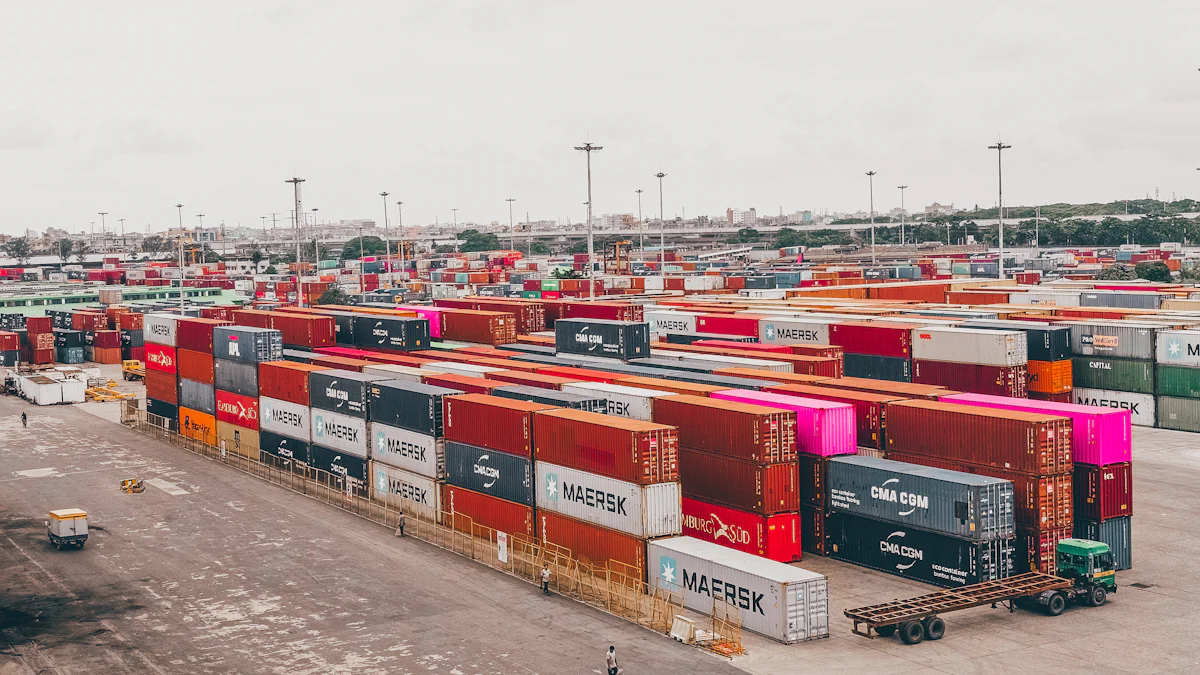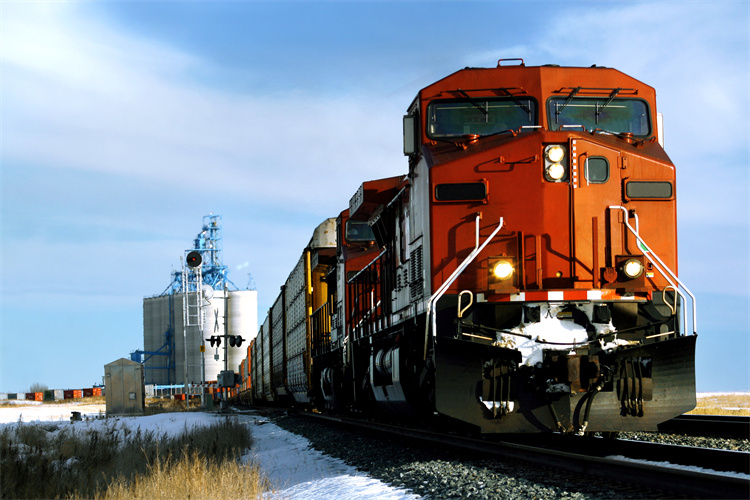Can China-Europe Express Rail Transform Your Business?

The China-Europe Express Rail has revolutionized logistics by offering a faster and more reliable alternative to traditional shipping methods. This service connects China with over 200 cities across 24 European nations, significantly enhancing trade efficiency. Businesses benefit from reduced transit times, with goods traveling from Xi'an to Duisburg in just 10 days, a two-day improvement from previous years. The rail network supports diverse cargo categories, facilitating seamless market access and operational transformation. As a result, companies experience enhanced cost efficiency, speed, and reliability in their supply chain operations.
Cost Efficiency of China-Europe Express Rail

The China-Europe Express Rail offers a compelling cost-efficient solution for businesses seeking to optimize their logistics operations. By providing a balance between speed and cost, this rail service stands out as a viable alternative to traditional shipping methods.
Comparison with Sea Freight
Cost Savings
Businesses often choose sea freight for its low cost, but the China-Europe Express Rail presents a competitive edge. While sea freight traditionally offers the lowest prices, recent trends have narrowed this gap. The rail service provides a cost-effective option, especially when considering the reduced transit times and the potential for lower inventory holding costs. Companies can benefit from the rail's ability to deliver goods more quickly, which can lead to faster turnover and reduced warehousing expenses.
Time Efficiency
Sea freight typically requires 35 to 45 days for delivery, whereas the China-Europe Express Rail completes the journey in approximately 12 days. This significant reduction in transit time allows businesses to respond more swiftly to market demands and reduces the risk of stockouts. The rail service's quicker customs procedures further enhance its time efficiency, making it an attractive choice for companies prioritizing speed in their supply chain.
Comparison with Air Freight
Cost Analysis
Air freight is known for its speed but comes with a high price tag. The China-Europe Express Rail offers a more affordable alternative, being up to 50% cheaper than air cargo for the same journey. This cost advantage makes the rail service a preferred option for businesses that require a balance between speed and budget constraints.
Speed vs. Cost Trade-off
While air freight remains the fastest mode of transport, the China-Europe Express Rail provides a middle ground. It offers faster transit times than sea freight and significantly lower costs than air freight. This trade-off allows businesses to maintain a competitive edge by optimizing their logistics expenses without compromising on delivery speed. The rail service's reliability and security further enhance its appeal, ensuring that goods arrive safely and on time.
Market Access through China-Europe Express Rail
The China-Europe Express Rail has opened new avenues for businesses seeking to expand their market reach. By connecting China with numerous European cities, this rail service has become a pivotal component in global trade dynamics.
New Market Opportunities
Access to European Markets
The China-Europe Express Rail provides businesses with unprecedented access to European markets. Companies can now transport goods swiftly and efficiently across the continent, reaching over 200 cities. This connectivity allows businesses to tap into diverse consumer bases, enhancing their market presence and competitiveness. The rail service's reliability ensures that products arrive on time, fostering trust and long-term relationships with European partners.
Access to Chinese Markets
European companies benefit significantly from the China-Europe Express Rail by gaining easier access to Chinese markets. The rail network facilitates the smooth movement of goods, enabling European businesses to penetrate the vast Chinese market. This access promotes economic cooperation and strengthens trade ties between the two regions. By leveraging the rail service, European companies can explore new business opportunities and expand their footprint in Asia.
Strategic Business Expansion
Enhanced Distribution Networks
The China-Europe Express Rail enhances distribution networks by providing a seamless logistics solution. Businesses can optimize their supply chains, reducing transit times and costs. The rail service supports multimodal transportation, integrating sea-rail, road-rail, and air-rail options. This flexibility allows companies to tailor their logistics strategies, ensuring efficient distribution across the Eurasian continent.
Competitive Advantage
Businesses utilizing the China-Europe Express Rail gain a competitive advantage in the global market. The rail service offers a faster and more cost-effective alternative to traditional shipping methods. Companies can respond quickly to market demands, reducing lead times and improving customer satisfaction. The rail network's extensive reach and reliability position businesses to capitalize on emerging opportunities and maintain a strong market presence.
Environmental Impact of China-Europe Express Rail

Sustainability Benefits
Lower Carbon Emissions
The China-Europe Express Rail significantly reduces carbon emissions compared to other transportation modes. Trains produce fewer CO2 emissions per tonne-kilometer transported, making them a greener alternative. This reduction in emissions plays a crucial role in mitigating climate change and promoting environmental sustainability. Businesses that choose rail transport contribute to a decrease in their overall carbon footprint, aligning with global efforts to reduce greenhouse gas emissions.
Energy Efficiency
Rail transport offers superior energy efficiency. Trains consume less energy per mile traveled than airplanes, making them an environmentally friendly choice. This efficiency not only reduces energy consumption but also lowers operational costs for businesses. By opting for rail transport, companies can achieve both economic and environmental benefits, supporting their sustainability goals.
Comparison with Other Transport Modes
Environmental Footprint
Rail transport boasts a smaller environmental footprint compared to air and sea transport. While airfreight is the fastest, it generates the highest emissions. Sea freight, although more efficient than air, still produces significant emissions. In contrast, rail transport provides a balanced solution with lower emissions, making it a preferred choice for environmentally conscious businesses.
Long-term Sustainability
Rail transport's role in long-term sustainability cannot be overstated. As the world moves towards greener practices, railways offer a viable solution for reducing overall greenhouse gas emissions. The China-Europe Express Rail exemplifies this shift, providing a sustainable alternative that many companies are eager to embrace. By integrating rail transport into their logistics strategies, businesses can enhance their sustainability efforts and contribute to a greener future.
Case Studies of Business Transformation with JUSDA
Successful Business Transformations
SHARP's Experience
Sharp, a globally recognized household appliances manufacturer, faced significant challenges in its supply chain. After being acquired by Foxconn in 2016, Sharp restructured its logistics department, forming SHARP JUSDA LOGISTICS (SJL) in collaboration with JUSDA. This partnership implemented a comprehensive supply chain optimization strategy using a software + hardware + solutions model. As a result, Sharp experienced a 20% reduction in logistics costs, a 70% decrease in labor costs, and a 30% improvement in order delivery times. This transformation showcases the effectiveness of JUSDA's solutions in addressing complex supply chain issues.
Other Notable Examples
Lu Zhao, head of a Chengdu-based freight forwarding company, highlighted the China-Europe Railway Express' ability to provide stability and predictability for international supply chains. This consistency proves crucial for industries reliant on timely deliveries. Similarly, Julija Sciglaite, RailGate Europe's chief business development officer, noted that the company uses the China-Europe Express Rail due to its significantly better journey time compared to sea routes. These examples demonstrate how businesses leverage the rail service to enhance their logistics operations.

JUSDA Solutions
To provide you with professional solutions and quotations.
Lessons Learned
Best Practices
Successful transformations often involve adopting best practices that align with the unique needs of each business. Companies like Sharp have benefited from integrating advanced technologies and optimizing resource allocation. By employing strategies such as vendor-managed inventory (VMI) and just-in-time (JIT) logistics, businesses can achieve real-time inventory management and reduce order processing cycles. These practices not only streamline operations but also enhance overall efficiency.
Challenges and Solutions
While the China-Europe Railway Express offers numerous advantages, businesses must navigate challenges like infrastructure limitations and geopolitical tensions. Understanding these dynamics is vital for maximizing the railway's potential in international logistics. Companies can overcome these obstacles by collaborating with experienced partners like JUSDA, who provide tailored solutions and expertise in handling complex supply chain issues. By addressing these challenges, businesses can fully capitalize on the benefits of the China-Europe Express Rail.
The China-Europe Express Rail stands as a transformative tool for businesses aiming to optimize logistics and expand their market reach. By offering a balanced solution between cost and speed, it reshapes supply chain strategies. Companies capitalize on its efficient route for cross-continental trade, enhancing their operational efficiency. The rail network's improved connectivity prompts businesses to reevaluate logistics strategies, aligning with the New Economic Geography theory by promoting regional integration. As more companies incorporate rail freight into their supply chains, the China-Europe Express Rail continues to drive economic activities along the Eurasian corridor.
See Also
Discover If Your Supply Chain Operates Efficiently Today!
Exploring 2024's Latest Developments in Sea Freight Logistics
Get Prepared: Discover New Transport Tech for Supply Chains
Transforming Future Logistics with AI in Supply Chains
Revealing Innovative Approaches to Cross-Border Supplier Relationships
